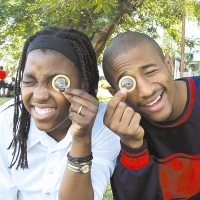Condoms and Compassion from America to Benin
Jan 21, 2015
First story


Ever since I began interning with Pathfinder International, a nonprofit organization that brings reproductive health services and information to people in developing counties, I have been itching to go to Africa and see some of our projects at work. My friend Monica recently got back from a service learning trip with our university to Benin, Africa and needless to say, I was incredibly jealous. The first night she arrived back in the States we talked for hours. I sat there drinking it all in, trying to live vicariously through her tales.
She told me about when she and her classmates arrived in Benin and met with students from a local university in Cotonou. The two groups of students were assigned to discuss problems they experience in their own countries and how they are working to fix them. One of the problems both groups identified was health. Monica told me how during the discussion, Mary, one of the students from Benin, asked an important question.
“She said a big problem in their country is that girls get pregnant before they are ready to and then have to drop out of school. She wanted to know how to stop that from happening.” Monica said. “But her question was totally dismissed—no one in the group ever answered her properly.” My interest in reproductive health and newly developed Pathfinder loyalty caused my ears to perk up at these words.
Monica continued her story, telling me how she was able to catch Mary alone later that day and answer the question herself.
“I told her how in the US we have ways of preventing pregnancy like birth control pills and condoms. And I told her how there are even places that will give out free condoms. Then I remembered that I actually had some with me—” She stopped short as I raised my eyebrows at her.
“Not that I was planning on using them!” She said, and I laughed. “What?” she said in an attempt at an innocent voice. “They were just in one of the bags I brought and I never got around to taking them out.”
“Uh-huh, sure” I said mockingly. And when she began to protest I simply said, “Go on.” Pouting a little, she continued.
“Well then, and this is the part that blows my mind, then she asked me if condoms would also prevent diseases. She didn’t even know! I couldn’t believe it. Here I am, growing up hearing ‘use protection’ and ‘safe sex’ from the media, from sex-ed teachers, and eventually from my own mother and she doesn’t even know what that means! It just made me so sad and so scared for her and the next day I made sure to bring the condoms with me to give to her.”
I couldn’t stop beaming at her. Not only was I proud of Monica for recognizing the importance of Mary’s question and taking the time to provide this girl with potentially lifesaving information but also, without even trying, she had discovered for herself the great demand for contraceptives and the need for comprehensive sexual and reproductive health information and services in the developing world. Her trip had not been focused on reproductive health, or even health in general, yet these issues are so prevalent that the topic was brought up anyway.
Mary’s situation is not unique. Two hundred million women around the world want, but lack access to, contraceptives. This puts them at risk not only for unintended pregnancy, but for contracting sexually transmitted diseases such as HIV, both of which can end a young girl’s pursuit of education, lower her income earning potential, and of course, endanger her life. Providing women with access to contraceptives has been proven to be one of the most cost effective ways to prevent maternal mortality, keep girls in school, and prevent the spread of HIV.
Monica may have only been able to supply Mary with a few condoms but the information she gave her will last a lifetime.




